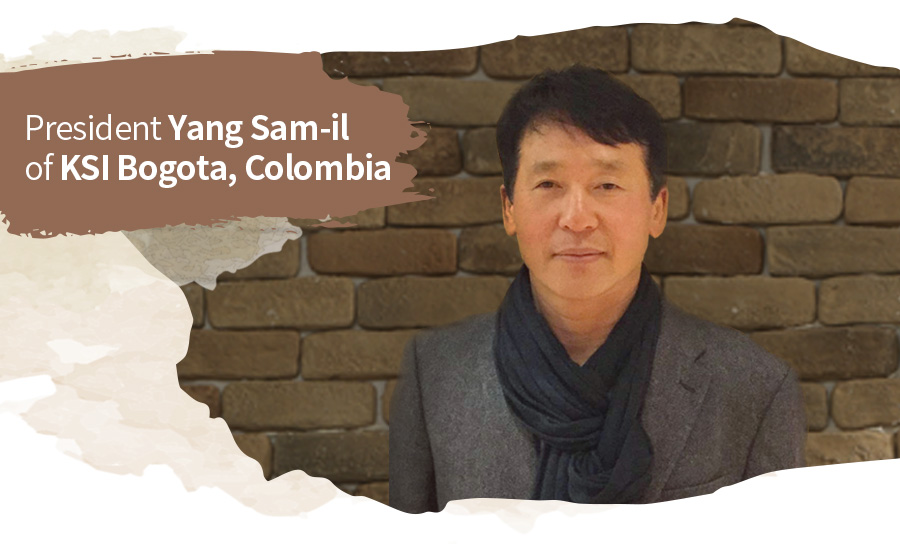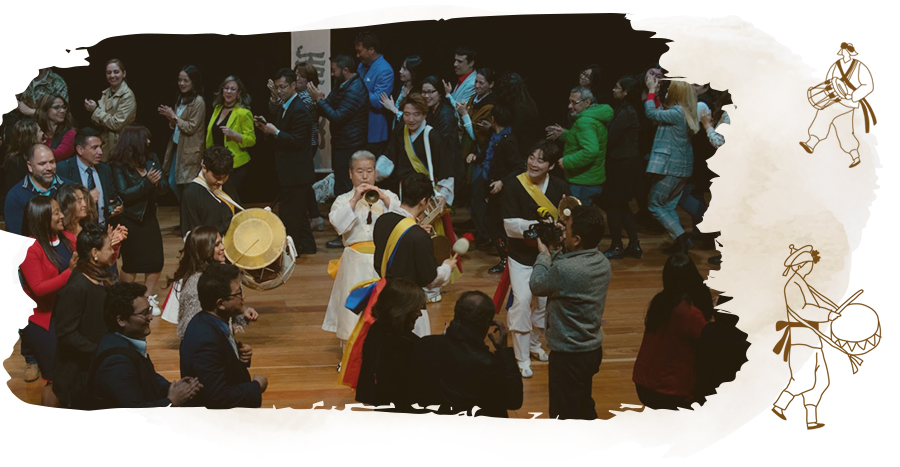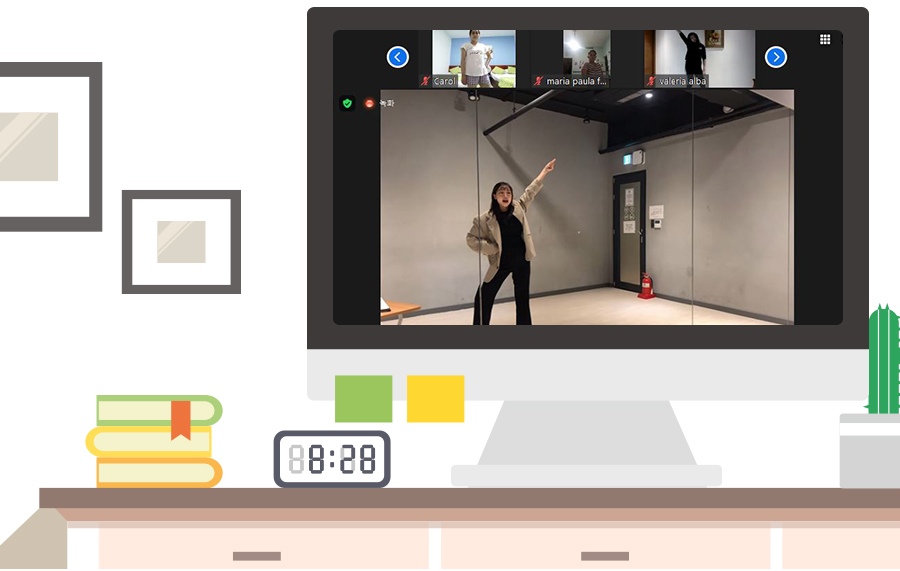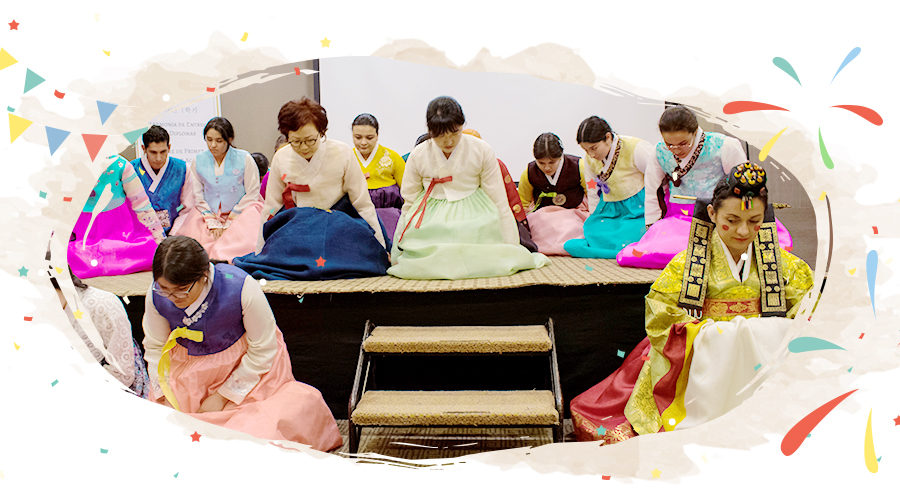Shaping First Impressions of Korea in the World
Writer홍보협력팀
Tag
2021-10-15
View711



Shaping First Impressions of Korea in the World
In the 1990s, long before the global K-culture craze hit the world, there was a man who introduced Korean culture to Colombia and led the cultural exchanges between the two countries. Thanks to him, the country’s cultural community gained a positive impression about Korean culture. Let us meet Yang Sam-il, President of KSI Bogota, the first place to discover Korea in Colombia.
 I wonder what paths you’ve followed so far to become the president of KSI at Bogota, Colombia.
I wonder what paths you’ve followed so far to become the president of KSI at Bogota, Colombia.
t’s been almost 40 years since I started living in Colombia. To look back on the past years, the first thing I remember is the time when I came to study abroad in Colombia, at the University of Los Andes. I was able to study political science, philosophy, and literature from excellent professors. Based on the knowledge and experience I acquired at the time, I was able to deal with hardships in my life. The classmates and friends from the university who have since become experts and leaders in their fields in Colombian society have also become a great asset to me.
After graduating, I participated in a show that delivers news about Colombia and Korea and informs people of their culture. I also had interviews with major figures, including the presidents of Mexico and Colombia, as well as high-ranking government officials. In doing so, I wanted to introduce Korea more systematically, and since the mid-1990s, I started introducing Korean cultural figures to Colombian culture. As the cultural exchanges grew bigger, I established the Asia Iberoamerica cultural foundation, and introduced more than 100 Asian art groups to Latin America. Meanwhile, I was told by several cultural figures that it would be nice if our foundation could become an outpost for disseminating Korean language and culture. That is when I came across the King Sejong Institute Foundation.
 What efforts did you make for KSI Bogota to open?
What efforts did you make for KSI Bogota to open?
Although we have been disseminating Korean culture through the Foundation, developing the role as an institution to teach Korean language and culture to the local people required more preparation. First of all, I wanted KSI Bogota to be a "cultural guest room" that was open to everyone. To accommodate more learners, we remodeled the Foundation building to provide administrative offices and lecture rooms. We also added facilities that can hold large-scale events.
I met frequently with the secretary at the Korean Embassy in charge of cultural affairs to discuss the operating plan for KSI and share our visions. After it was designated as KSI, we regularly communicate with various organizations such as KOICA, as well as the embassy, to make arrangement so that the programs run by each of us do not overlap. We also actively communicate and cooperate with Korean companies here to promote the King Sejong Institute.

 What is the local reaction to KSI Bogota?
What is the local reaction to KSI Bogota?
When KSI Bogota was established in 2012, the Colombians’ awareness of Korean popular art was low. Colombians had little interest in Asian culture − only mainly among Japanese culture enthusiasts − and the number was very small.
However, Colombia has maintained ties with Korea for a long time, since they sent troops to fight in the Korean War. Although the awareness of Korea culture was low, the atmosphere was favorable to Korea. Also, our foundation had been promoting various aspects of Korean culture over the past years. We were recognized and supported by the local cultural community, and we were able to open KSI Bogota with positive public interest and support.
The number of learners at our institute started with 27, and has greatly increased to 512 as of last year. In addition, more than 1,000 learners per year participate in Korean culture classes such as the Sejong Culture Academy. Our institute has been working hard to establish itself as a culture specialized institute, by taking advantage of the fact that it is run by a cultural foundation. We analyzed programs of international language institutions that have been operating in Colombia for more than 60 years, including Alliance Francaise and the British Council, and worked hard to provide programs that could compete with theirs. In addition, we are preparing for the new ecosystem of the digital education environment, caused by the pandemic.
Recently in Colombia, the flood of supplies and unreasonable expansion of the Confucius Institute of China has aroused antipathy. Taking this as a lesson, KSI Bogota will do its best to become a “Little Korea” in Colombia, even with slow steps.
 Please tell us about aspects of Korean culture that draw the biggest attention from Colombians these days.
Please tell us about aspects of Korean culture that draw the biggest attention from Colombians these days.
Colombia is the cultural powerhouse called "the Athens of Latin America." It is for this reason that cultural and artistic performances from Europe and the Americas are first introduced to Mexico and Colombia. In the music field, Colombian singers are sweeping the Latin Grammys, and they are dominating the entertainment sector by running major American agencies. Garcia Marquez, a Nobel laureate in literature, as well as Fernando Botero, a master of contemporary art, are also from Colombia.
KSI Bogota introduces Korean culture in consideration of these cultural characteristics and the status of Colombia. Among the programs introduced so far, the ones that received favorable reviews contained content that was both Korean and global. For example, there are Shim Cheong, the Korean classic performed by the Universal Ballet, and the Madang Concerto in which the Bogota Philharmonic and the Korean Samulnori performed together. Other than those, a performance by children of the Little Angels Art Troupe, which are praised by local critics as "young giants," and the exhibition of hanji crafts by Kim Bin also received attention.
Recently, as Korean shows, music, movies, and dramas can be easily accessed through various OTT and SNS, awareness of Korean language and culture is increasing. People’s interest in K-culture, represented by BTS and the movie Parasite, is leading to interest in not only the culture but also the Korean language. In addition, the “K-quarantine” syndrome created by the pandemic gave a new impression of Korea. They think of Korea as a safe country that they would like to live in.
Not long ago, I met elementary students at a public school in a low-income region in the outskirts of the city. They said I am the first Asian person they have met. The first question they asked was, “I heard a member of BTS is good at cooking, is that true?” It was a unique experience to hear ‘BTS’ from children in the suburbs who seemed to know nothing about Korea. I realized once again the status of Korean culture spreading all over the world.

 What are the changes in education method or communication due to the continued spread of COVID-19?
What are the changes in education method or communication due to the continued spread of COVID-19?
KSI Bogota switched to online as soon as COVID-19 spread. The background of this preemptive change was the forum that our foundation prepared with KACES, etc., when Ivan Duque was inaugurated as the President of Colombia in 2018. The forum under the theme of “The 4th Industrial Revolution and Changes in the Ecosystem” became a major help in predicting the wave of change and moving into the digital ecosystem.
Our institute is also thinking a lot about how to efficiently operate cultural classes such as the Sejong Culture Academy in the "untact" era. Faculty and related personnel worked together to create a program that maximizes the advantages of the digital platform. For example, we once held a digital lecture where people could meet experts of Korea in real-time, as it was difficult to invite them to meet face-to-face. It received an amazing response. We will continue to take the lead in establishing a paradigm for new cultural programs that connect face-to-face and non-face-to-face, with innovative ideas and actions.
 Please tell us about the future goals and plans of KSI Bogota.
Please tell us about the future goals and plans of KSI Bogota.
A student who has been with KSI Bogota for ten years since the opening has recently got into the graduate school of Yonsei University as a GKS scholarship student. The student who was in middle school when he started became a graduate school student now. There is nothing more rewarding and happier than seeing learners grow like this.
So far, our institute has focused on organizing a systematic program that can disseminate Korean language and culture and provide opportunities to experience them. Now, I would like to support the learners from KSI Bogota who have studied Korean so that they can grow even bigger. We plan to provide them opportunities to find jobs at companies and organizations in Colombia, and support them to work as experts in major Colombian institutions.
In addition, I want to develop a program that introduces cultures in various regions of Korea by making agreement with local governments in Korea, and try internship programs in Colombia for college graduating students in Korea.

 Do you have something to say to the teachers and students of KSI around the world?
Do you have something to say to the teachers and students of KSI around the world?
Our institute, like all KSI around the world, is having a difficult time due to the spread of COVID-19. Some of our dispatched teachers in our institute had to be forced to self-quarantine only a month after they got here, without time to adjust here. Now, they returned to Korea and are giving online classes. It is a regret that I cannot do anything to help, as the president of the institute.
I would like to encourage all the teachers and students of KSI around the world, who are passionately trying to cope with these difficult times. I hope that we will all work together to develop King Sejong Institute amidst the upcoming post-pandemic era.
With the development of technology, people around the world can indirectly find and experience Korea anytime, anywhere. Various Korean cultural attractions such as BTS, Parasite, K-culture, and K-quarantine are becoming the first impression of Korea to the world. I believe that the role of KSI is the same. KSI Bogota will always work hard to make “the first encountered Korea” to be remembered for a long time by the learners, so that they will want to be back for it.

